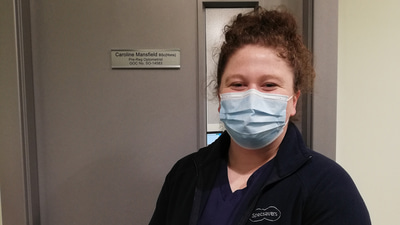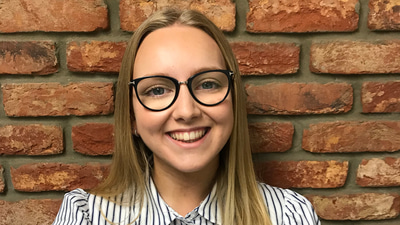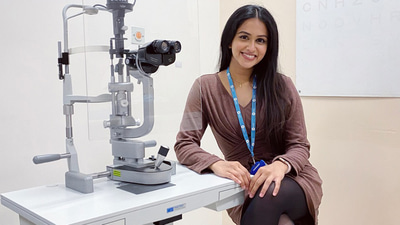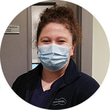- OT
- Life in practice
- Career development
- “Every patient is a new experience”
Pre-reg focus
“Every patient is a new experience”
With the OSCEs in full swing, OT caught up with our 2021/2022 Pre-reg focus cohort to reflect on their feelings as qualification looms

OT’s pre-reg contributors
- Caroline Mansfield, pre-reg at Specsavers Haverfordwest, Wales
- Holly Leitch, newly-qualified optometrist who completed her pre-reg at Urquhart Opticians, Kilmarnock
- Thaksha Sriatharan, pre-reg at Manchester Royal Eye Hospital.
Have you had a particularly inspiring or standout moment during your pre-reg?
Caroline Mansfield (CM): Because of where I work, I have been fortunate to see quite complex cases. My optometrist colleagues often bring me in the room when they see something worthwhile.The exhilaration that came with passing my Stage 1 was probably my favourite moment so far. Work paying off is always what keeps me going. It also coincided with the week before my wedding, so that was a great week for me.
Holly Leitch (HL): A standout moment for me was with a patient who booked an appointment online the evening before, having had an eye exam the previous day elsewhere. When the patient attended, she was very upset. She felt she had been given very bad news in the previous appointment, and was looking into health insurance and making a will.
When I assessed her, the information given was incorrect, and there wasn’t anything to worry about – the issue just needed monitoring. It was perhaps the way the information had been communicated that left the patient extremely worried. This taught me the importance of clear communication and relationship building with patients, as well giving the patient time to ask questions to ensure they understand the outcome of their appointment.Work paying off is always what keeps me going
Thaksha Sriatharan (TS): I once came across a patient with advanced keratoconus, who could just about see the +1.30 logMAR binocularly in their glasses. The patient came in for a contact lens fit assessment, and after spending time fitting rigid gas permeable lenses, I was able to bring the patient’s best corrected vision to +0.00 logMAR. The patient was very grateful, and it brought tears to their eyes. Helping that patient’s quality of life was a very humbling experience.

What was your scariest/most intimidating moment?
CM: My scariest moment was the lead up to Visit 3. From the beginning of my pre-reg, I have been honing my routine and getting used to working through all of the components that are required in a normal sight test, but being observed over a whole sight test with an assessor in person was daunting – I had not been under that kind of scrutiny since university.Before that visit, my supervisor Angharad watched me and gave me pointers on what I did well and what I could work on. I found this very useful in the lead up. I thought I had 'bigged-up' that assessment in my head, but I felt all those same nerves for the Stage 2 visit. It’s silly really, because I feel most confident in the practical elements and so these assessments should be the ones I feel good about.
HL: The scariest moment was when a young patient fell ill during the eye exam. I had to call an ambulance, wait for with the family for it to arrive, and speak with the paramedics when they got to the practice. This was two months into my pre-reg, and you aren’t expecting a situation like that to arise. I had to remain calm and help comfort the patient’s parent in the room, while dealing with the situation quietly so as not to alarm the rest of our patients in the practice at that time.I’m looking forward to being independent in my clinical decision making and working with different teams within the business
TS: My scariest moment had to be when I was first starting out. The optometry department at the Manchester Royal Eye Hospital is quite big, and there were a lot of people to meet. Although everyone is lovely and friendly, it was intimidating to be working with world-class leaders in the field.
How do you see your day-to-day work changing now your pre-reg is over or almost over?
CM: I anticipate that my clinic times will be shorter, and my clinical decision-making process will have to become faster. However, when I think about it, there’ll be half the paperwork without all the pre-registration stuff, so it should be easier than I think. I think it’ll be a little bit more stressful to begin with and the thought of not having a supervisor is daunting, but seeing more complex cases during the pre-reg year has prepared me well.HL: Over the last year I have worked closely alongside my supervisor in our Kilmarnock practice, now I am fully qualified I can work between our different locations, and in smaller practices suck as Troon and Prestwick, where I will be testing on my own. I’m looking forward to being independent in my clinical decision making and working with different teams within the business.It will be great getting to know different clients in a different town. This is a fresh opportunity for me
TS: I will be more independent in my decision making and patient management. I also hope to learn more techniques, such as gonioscopy and advanced OCT interpretation, and I would like to be more active on social media in order to share my knowledge.
What are your plans for the coming year?

HL: Urquhart Opticians has recently acquired new practices. I will be working in our Lanark store on testing days, managing a new team and building my patient base there. It will be great getting to know different clients in a different town. This is a fresh opportunity for me.
TS: I hope to be more confident in my clinical skills as I see patients unsupervised in the core clinics. I will have the chance to take on extended roles within the hospital, such as community paediatric clinics and Lasik clinics, and also be involved in teaching and education.
Where do you see yourself in five years’ time?
CM: I hope to have a stable job and continue to do what I love, working alongside top professionals and learning more every day. I like the thought of creating a broad knowledge base in further education first, before specialising. Paediatrics takes my fancy at the moment. This might change with the additional courses, but at the moment, paediatric optometry has my name on it.
HL: In five years, I see myself continuing with Urquhart and being responsible for my own practice as a manager. By then I hope to have achieved my independent prescribing and have made further progress in my clinic ability.I love that as an optometrist the possibilities are endless, and there are multiple avenues that I can explore
TS: At this moment, I’m not sure where my career will take me. I see myself having completed further qualifications, such as IP. I love that as an optometrist the possibilities are endless, and there are multiple avenues that I can explore.
What’s the one piece of advice you’d give to those starting out on their pre-reg journey?

HL: Read up on and understand every stage of the pre-reg journey before you begin. Sit down and read the College of Optometrists’ information on each stage: Stage 1, Stage 2 and OSCE. Understanding how each part is assessed is vital to getting through it, and makes life much easier. I thought I understood what to expect, but I was surprised by my first assessment.
TS: Plan early. Familiarise yourself with the core competencies and what evidence they require. For example, colour vision competency requires you to confirm the defect with two different tests. It would be a shame to not be able to use a record because all the required criteria haven’t been met.
If you could say one thing to your early pre-reg self, what would it be?
CM: Don’t panic, take a breath, and remember everyone wants you to be competent and succeed.
HL: You can do it. And have some self-belief: while it isn’t easy, it isn’t impossible. When I was struggling, one of our directors, Peter, told me “If it was easy, everyone would do it” and that stuck with me throughout my pre-reg.
TS: Every patient is a new experience. Don’t be afraid to take on complex patients, because at the end of the day they are who you learn the most from. Also, don’t be afraid to ask questions – it’s the best way to build your knowledge.
Can you tell us about your feelings ahead of your OSCE? Any advice on dealing with nerves?
CM: I am nervous for OSCEs, but I’m really enjoying revision. I like revisiting university notes and reminding myself the ways to remember different things. I will probably feel the nerves a lot more on the journey there on the day.
I’m not sure I have any tricks for dealing with my nerves: just reminding myself that I’m feeling them because I care about a good result and that, because I care, I’ve put the work and hours in to get it. In the moment I just need to remember to stay calm and answer what the question is asking.In the moment I just need to remember to stay calm and answer what the question is asking
TS: Ahead of sitting my OSCEs, I knew this was the last stretch of my pre-registration journey. I was one exam away from qualifying, and this was something that made me both excited and nervous.
OSCEs are intimidating due to the fact that it is a unique style of exam. I’m sure everyone is capable of all the five-minute tasks that will be examined on assessment day, however nerves can really get the best of us. Therefore, I tried to prepare for the unknown by doing as many mock OSCE stations as I could. I attended the mock OSCE courses run by the Johnson & Johnson STEP program and Out of the Box Optics. The Manchester Royal Eye Hospital also ran a mock OSCE ring, which was all very helpful. I was able to identify my strengths and weakness through these sessions and tailor my practice accordingly. To aid my revision, I would practise stations with my supervisors whenever clinic allowed, and I used the Optotutor online portal and revision books to guide and support my studying.
What were your immediate feelings after sitting the OSCEs?
HL: After sitting the OSCE I felt immediate relief that it was over. But I did also feel that it hadn’t been a disaster. I felt I had prepared well enough to take on the stations that came up and only really panicked at one of them.
I felt positive to have made it to the end of my pre-reg. While waiting the three weeks for the results I started to feel quite nervous, but I’m delighted to have passed. I feel slightly apprehensive moving forward without the support of my supervisor, but I’m very excited for the future.




Comments (0)
You must be logged in to join the discussion. Log in